Histamine, a naturally occurring compound in the body, plays a crucial role in our immune response, but an excess can lead to discomfort and a host of allergic symptoms.
However through careful dietary choices, it's possible to support your body's histamine balance and immune response. In this article we delve into the science of histamine, identify natural anti-histamine foods, and introduce the basics of an antihistamine diet.
Medical Disclaimer: as with everything on this site, this article is provided for information only. I strongly urge you to speak with your doctor or a licensed medical professional in order to assess whether or not you have histamine issues and/or other medical issues.
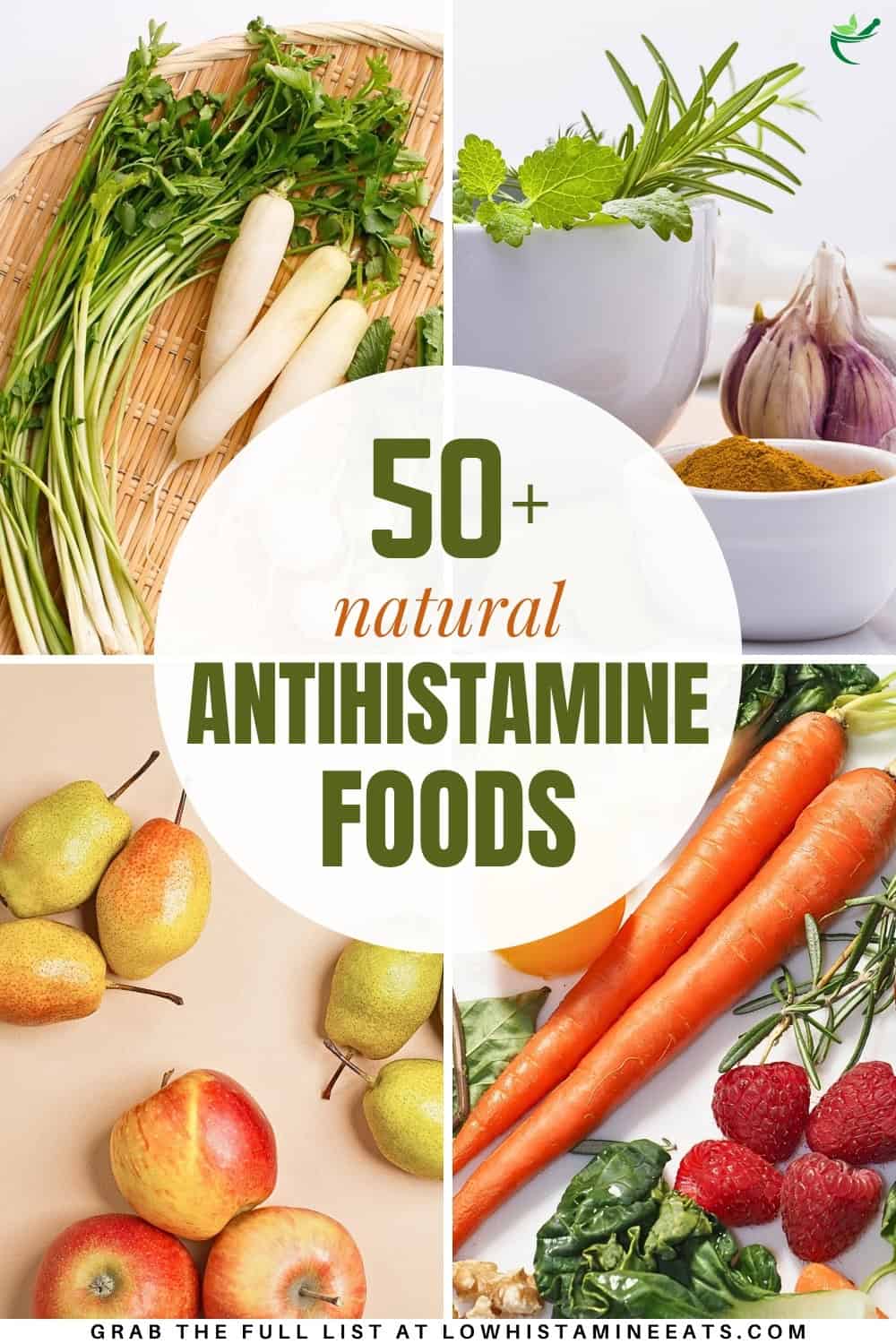
Jump to:
🤔 So what are histamines?
Histamine is a natural inflammatory substance released by the mast cells, which are a type of white blood cell responsible for immediate reactions to perceived allergens. When your histamine level overloads in one area of the body, it leads to inflammation, which can result in food allergy symptoms and even have a cascading effect upon the body.
Histidine decarboxylase (HDC) is the sole member of the histamine synthesis pathway, producing histamine out of the amino acid histidine in a one-step reaction (with Vitamin B6 as a cofactor).
This means that histamine can be produced very quickly, an evolutionary trait which is helpful for alerting you to danger, but less helpful if your immune system has begun interpreting everything as dangerous.
So while mast cells are an integral part of the body's immune response to foreign substances, sometimes they can become unstable and overreact to certain foods.
❓ What happens when mast cells destabilize?
They release histamine (and other inflammatory substances, albeit in smaller amounts), causing an inflammatory condition known as Mast Cell Activation Syndrome (MCAS). MCAS is a type of Mast Cell Activation Disorder (MCAD), a group of immune conditions which affect the functioning of mast cells.
Mastocytosis is a similar disorder, and treatment similarly involves lowering the body's histamine load. The first step towards calming this histamine reaction is to clean up your diet, and slowly add in more anti histamine foods.
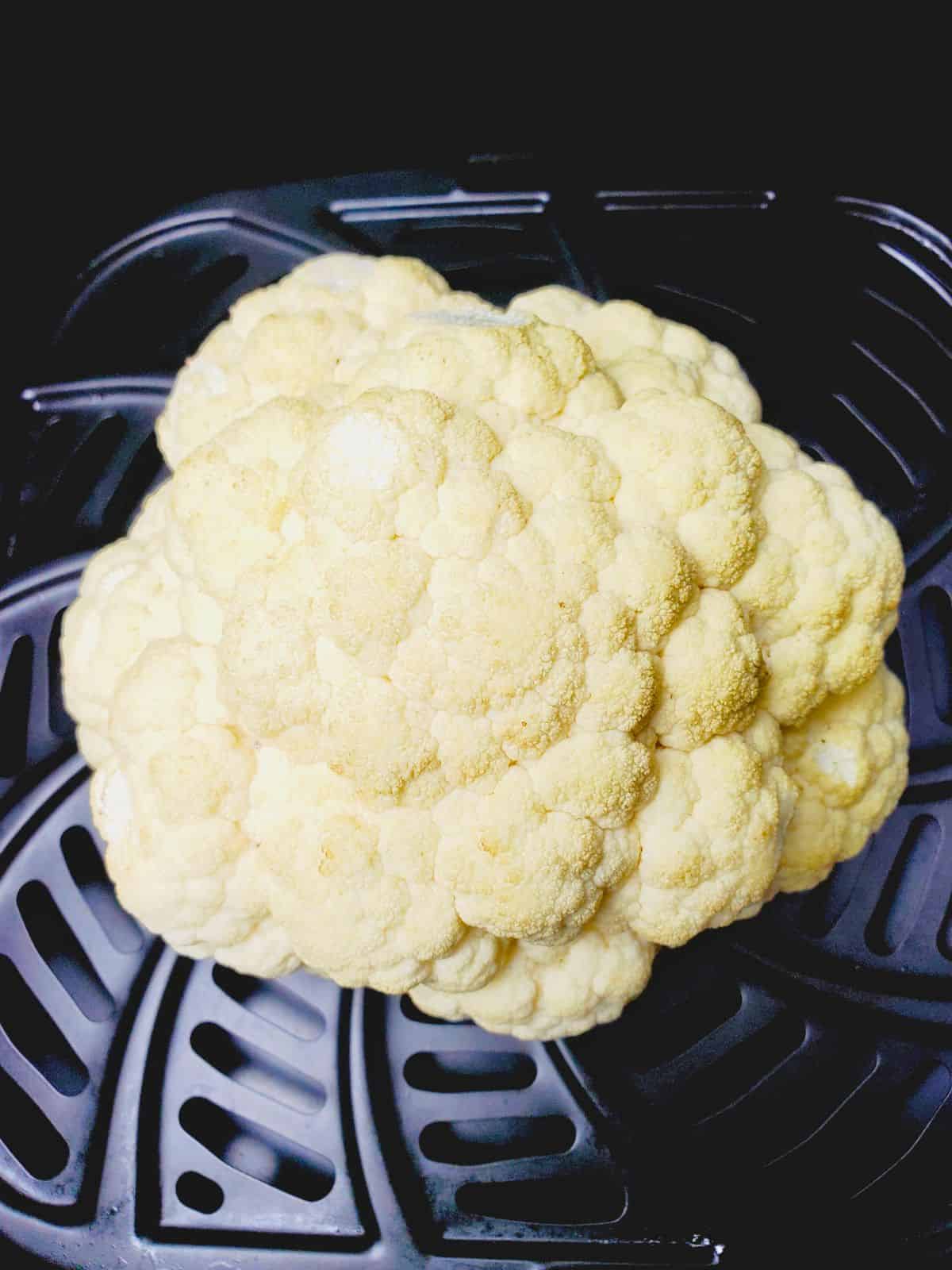
🌿 How do antihistamine foods help with histamine intolerance symptoms?
Food is really the best antihistamine for histamine intolerance, as most of us aren't necessarily overloaded by our environment— as with traditional histamine toxicity (a.k.a. seasonal allergies)— but by our food.
This goes back to the three main ways that histamine levels become problematic: ingested histamine, low DAO (diamine oxidase, which clears histamine), and histamine-liberating foods.
There can be genetic contributions, but these factors most commonly arise when we consume high histamine food, DAO-blocking food, and food which releases histamine from other foods.
Anti histamine foods are all naturally low in histamine, but they also bring other histamine-clearing benefits to the table. The foods' superpowers range from helping to stabilize mast cells to increasing DAO production or simply reversing oxidative damage from inflammation.
Some of them even interrupt the making of histamine itself, by affecting volume & rate of HDC production (thereby slowing the body's ability to produce histamine).
Most of them also contain a significant amount of one or more co-factors in the production of DAO, such as vitamin B12, saturated fats, zinc, magnesium, iron, and omega-3 fats.

📋 Natural Antihistamine Foods List
The antihistamine foods list below is a living document that I'll continue to update as I discover new ingredients which may help us in our pursuit of health and happiness— you should never have to prioritize one over the other.
If you've found this post because you're just getting started with a low histamine diet, I recommend beginning by reading my 5-day low histamine diet plan. Jumping into a whole new lifestyle headfirst can work for some people, but for others, adding or taking away a large variety of foods at once can send your system into a tailspin.
So before adding in a bunch of foods that lower histamine, consider a three-pronged approach of: 1) removing the highest histamine foods; 2) eating more low histamine foods in their place; and 3) adding in anti histamine foods last. All that said, below are dozens of foods with natural antihistamine properties.
Because I'm a science-minded individual who loves to cook, I've sorted each of these natural antihistamine foods based on their function in the kitchen. Most foods have multiple reasons why they're listed here, so I've done my best to link sources for further reading.
Antihistamine Herbs
- Basil (esp. Holy Basil)
- Cilantro
- Dill
- Lemongrass
- Mint (Spearmint, Peppermint)
- Oregano
- Parsley
- Rosemary
- Sage
- Thyme

Antihistamine Vegetables
- Artichoke
- Arugula
- Asparagus
- Beets
- Bell Pepper
- Bok Choy
- Broccoli (& Broccolini)
- Brussels Sprouts
- Cabbage
- Dandelion Root (also good as tea)
- Greens (Mustard, Collard)
- Onion
- Radish
- Squashes (other than pumpkin)
- Watercress
- Zucchini
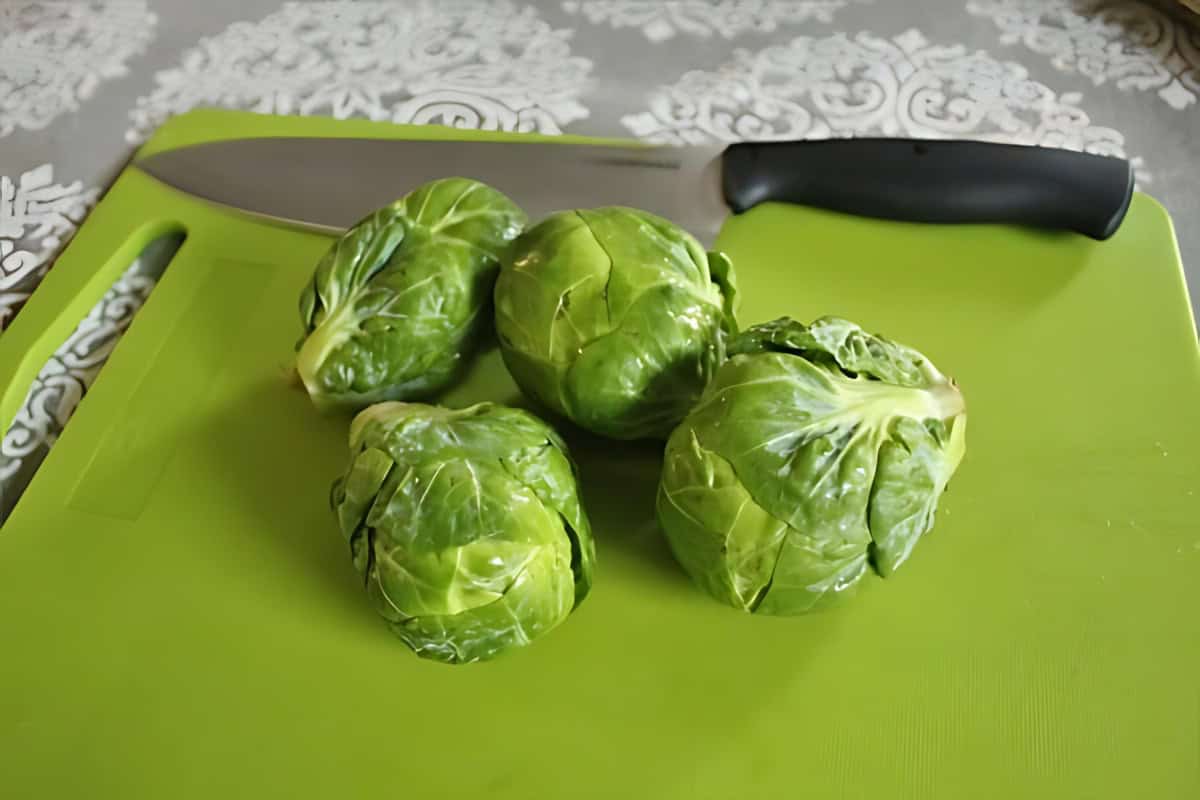
Antihistamine Fruits
- Apples
- Pomegranate
- Blueberries
- Blackberries
- Cherries
- Mangoes
- Kiwis
- Raspberries
- Peaches
- Pears
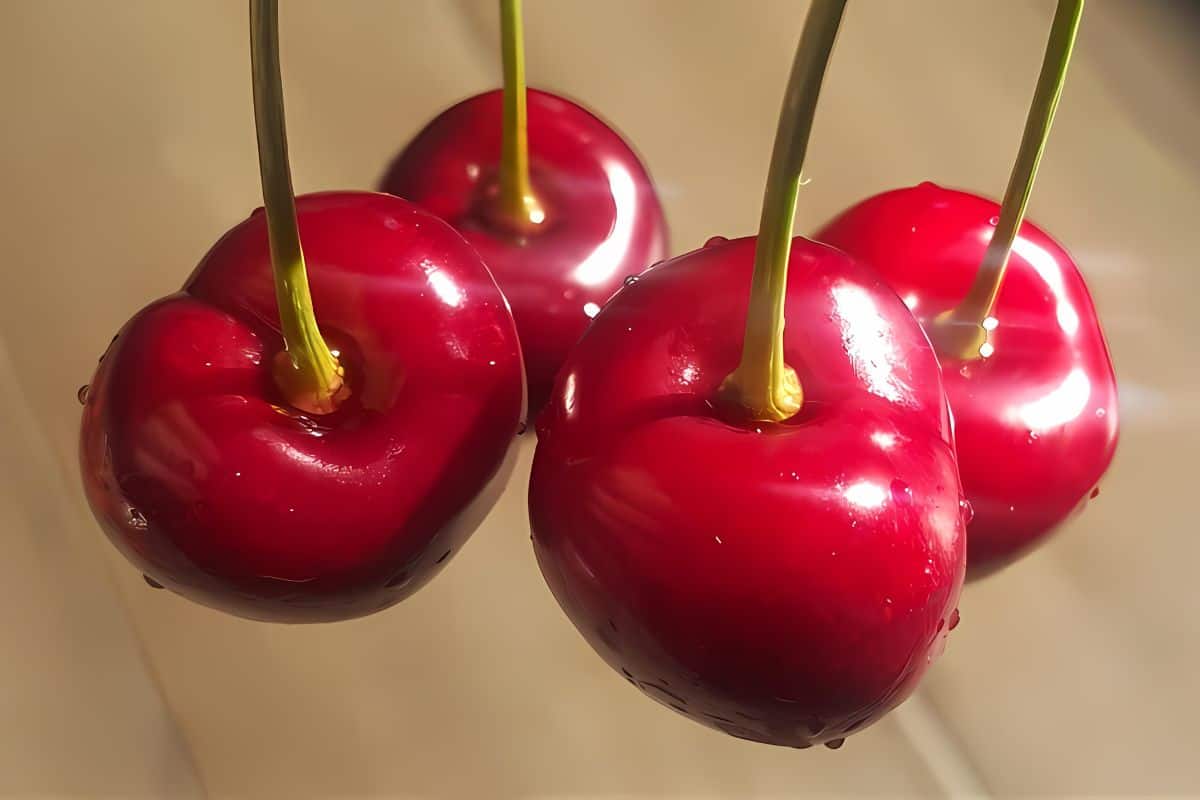
Other Natural Antihistamines
- Aloe Vera (anti-inflammatory in small doses; Thrive Market has a great selection)
- Fresh Capers (preserved in salt & rinsed before use are also ok)
- Hibiscus (great as a tea or chopped up and added to stews)
- Manuka Honey
- Monk Fruit Powder (as a powerful sweetener)
- Moringa (stabilizes mast cells)
- Spirulina (inhibits histamine release)
- Stinging Nettle (great for tea, or adding to smoothies in powdered form)
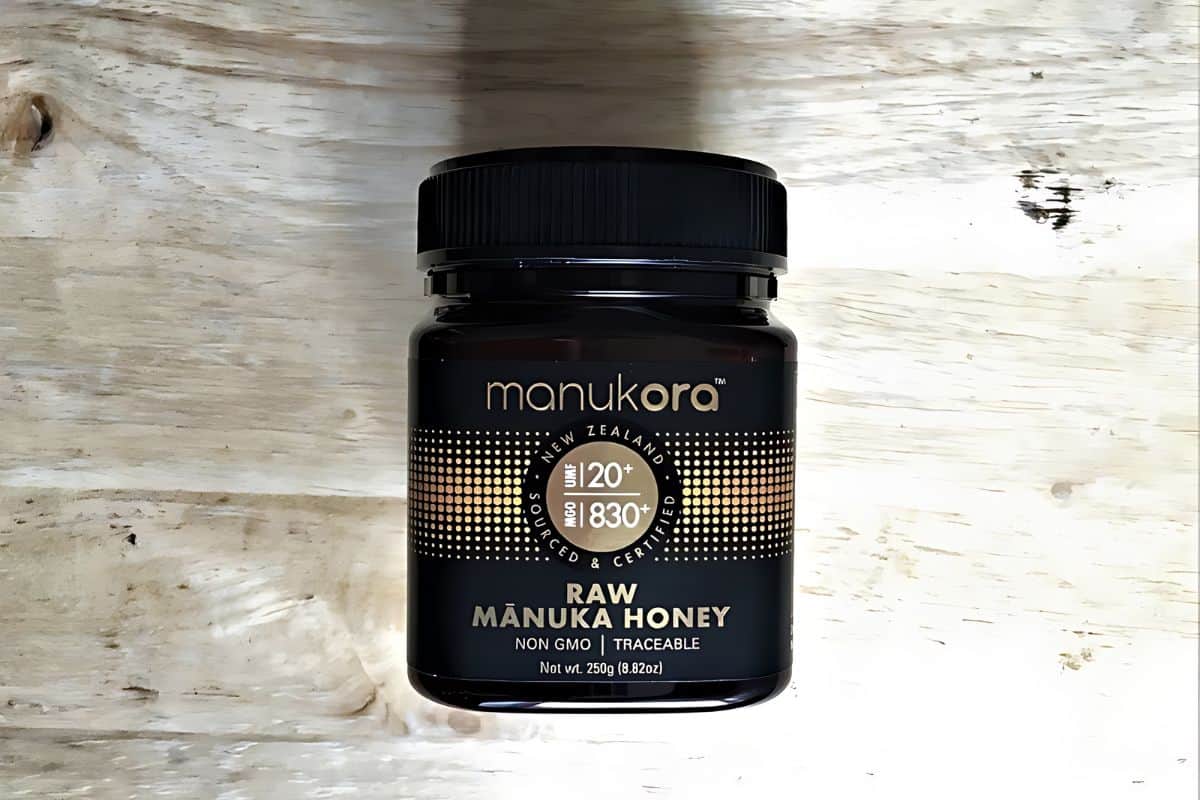
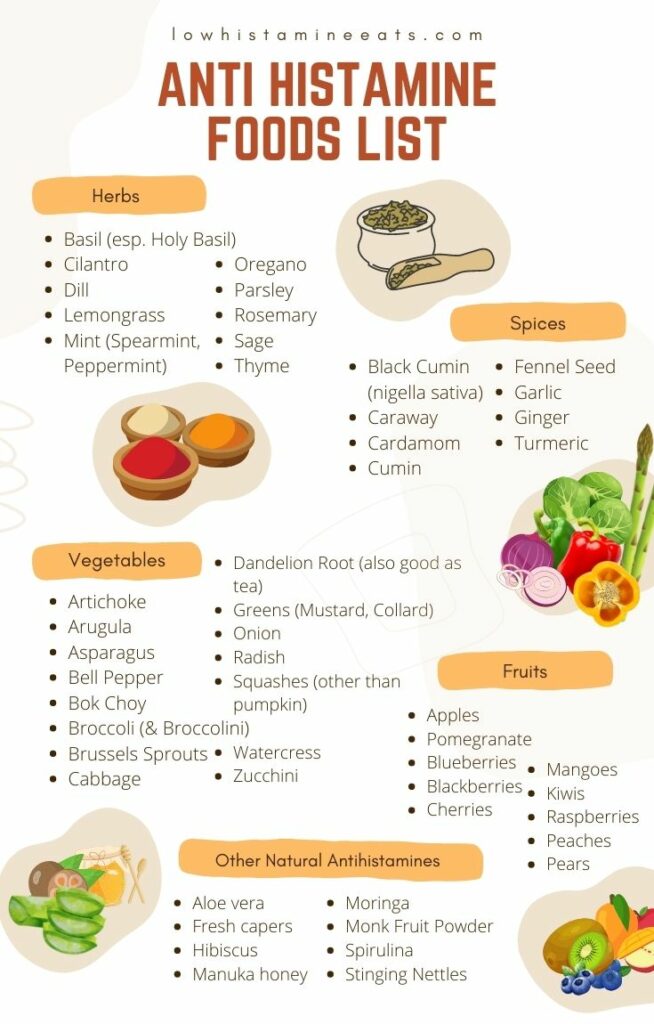
Whether you're struggling with a runny nose or a leaky gut, it's important to understand how natural antihistamines can help you heal. For those who've also chosen to consume your antihistamine in food form, do you have any others to add to the list?

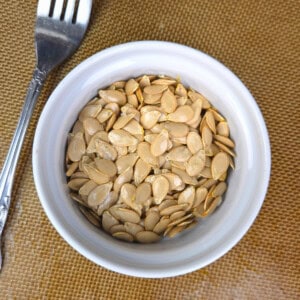
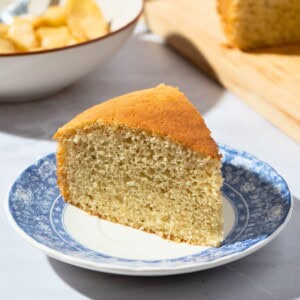
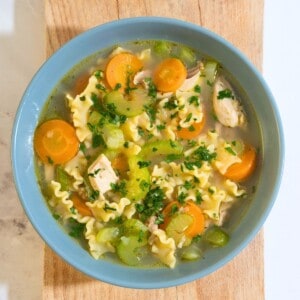
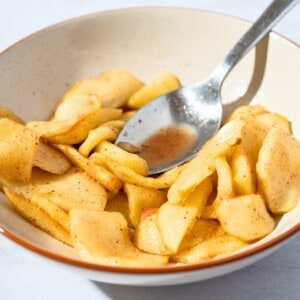
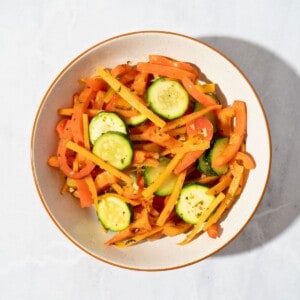
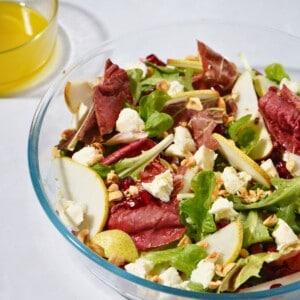
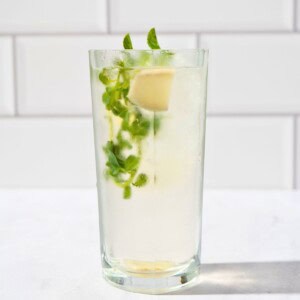
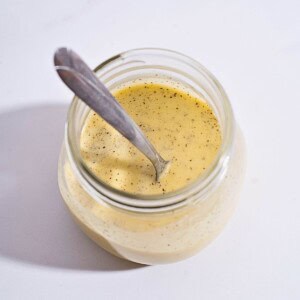
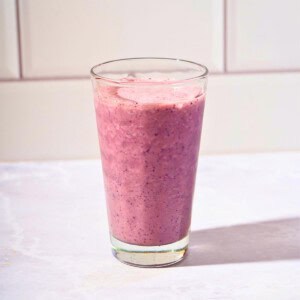
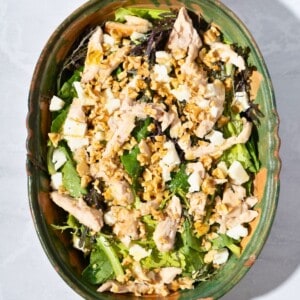
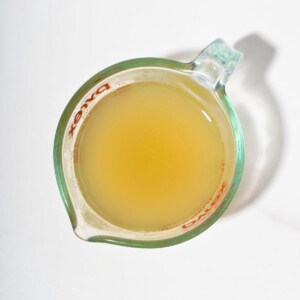
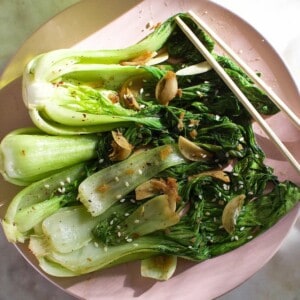

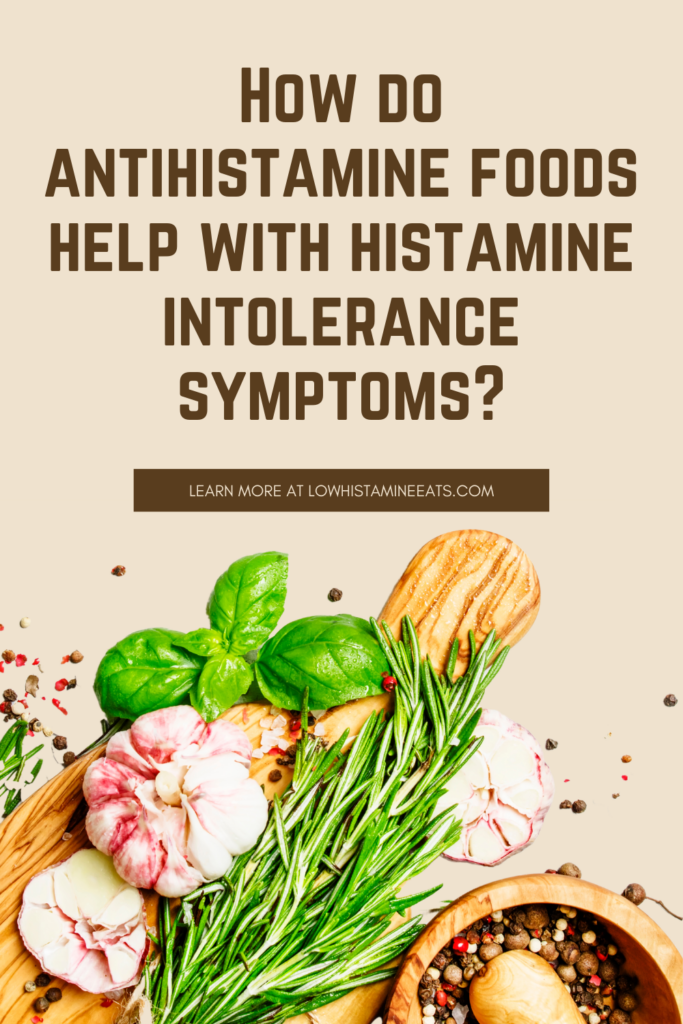
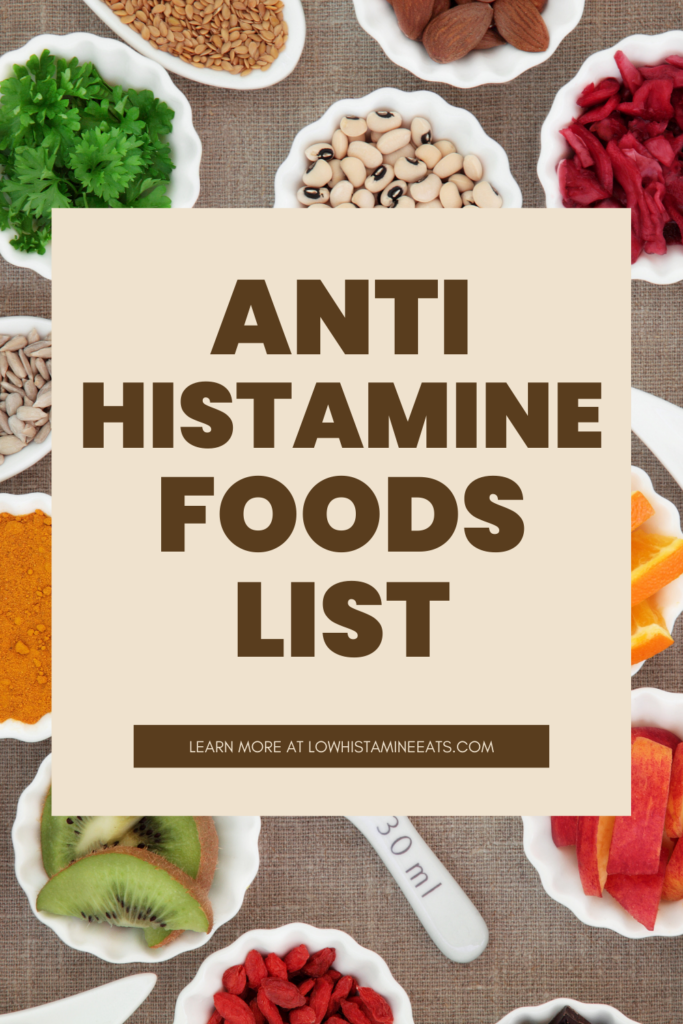
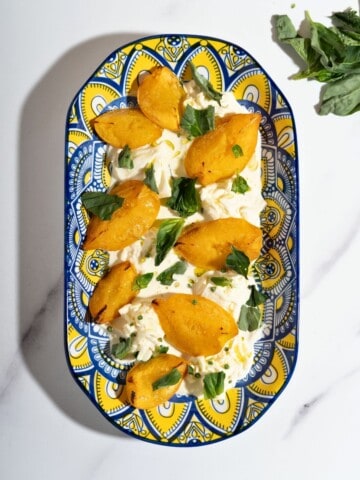
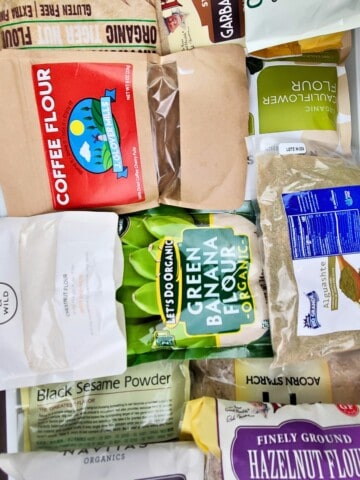
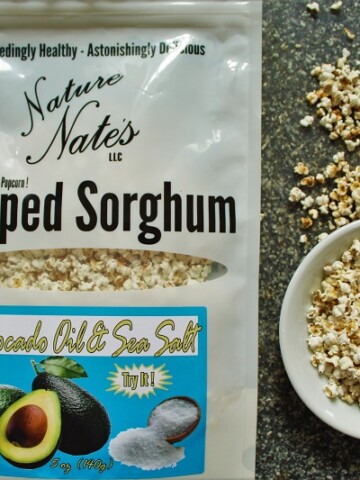
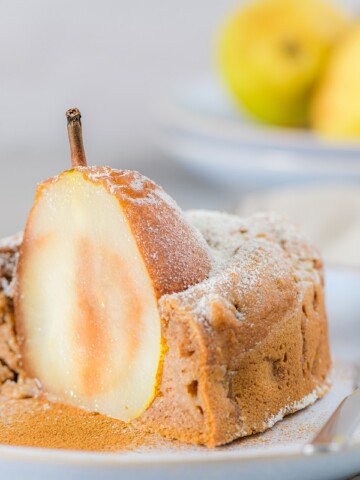
Dorothy says
Thank you for this informative site. I am just learning what has been causing my chronic headaches. First discovering the impact of gluten but when being gluten free didn’t resolve the headaches completely, I realized histamine was also impacting my health.
I started drinking bone broth and then meat broth (after realizing bone was high in histamine) because I read they can heal leaky gut. I started making my own meat broth, not cooking more than 4hrs, but since I started drinking it and not eating histamine foods, my headaches have not improved. Does it take some time to have an impact?
Can you tell me, if I use a dried powder form of bone broth, will it be high in histamine? The powder from would be so much easier than making my own. I know that bone broth is high in histamine but wonder if the dried form is lower in histamine.?
Thank you
Max says
Hi, Dorothy! I'm not a doctor, so this is just from my personal research, but powdered anything is going to be higher in histamine due to the processing required, but bone broth regardless is VERY high histamine. If you're looking to heal your gut, I recommend asking your doctor about l-glutamine-- it's slightly excitatory, so try to take it first thing in the morning at least an hour before eating. But l-glutamine is one of the main components in bone broths, besides collagen, which makes them so healing for the gut. I've been taking it on-and-off for the last few years and it always helps get my stomach back into gear. It comes in a white powdered form, and I recommend buying a high quality brand and taking it in water rather than a pill of some kind, so it has more immediate contact with the lining of your gut. I'm sorry you've been dealing with all this, but I'd swap the bone broth for the glutamine and give it at least a week alongside the low histamine diet!
Bill says
Hi Max,
I just wanted to say THANK YOU for the work you have put into this site. I had been to allergists and dermatologists with no luck, and was struggling for many months with itching skin that would become debilitating about once a week, before I found this site. I had tried tampering with my diet over the course of those months with no luck, but after finding your lists, I was able to clear up in one week! I am so grateful. If you use Bitcoin, I would love to send you some as a thank you and to support your work on this site. Feel free to email me.
Thank you!
Max says
That's very kind of you, Bill. I'm sorry you were dealing with that, but I'm so glad you've been able to heal & manage that through diet. But my favorite part about running this site it that every post makes this info just a little bit more accessible to everyone— please feel free to donate a little something in my honor, however!
Lee says
I have coeliac disease and multiple food intolerances. Recently diagnosed with hay fever and recommended to go on a low histamine diet. Unfortunately it's leaving very limited food options. I would be grateful to hear from anyone with multiple food intolerances and sharing in whatever has worked for them. Kind regards from Lee in New Zealand.
Nicole says
Hi there, thank you so much for your hard work (and probably a lot of personal trial and error) in compiling this list to help the rest of us. I have just started having having troubles this year, apparently going through menopause and low oestrogen is a time of life when it’s common to have histamine reactions even if you’ve never had them before (mine manifest in hives all over my neck and collarbone area). I really appreciate your list as a starting point, and will follow your 3 step advice on easing into a different way of eating. Thank you thank you 🙏 Nicole
Max says
I'm so sorry you're dealing with this, Nicole, but I hope this list (definitely a lot of research, and trial & error!) helps you stabilize and find some normality in this new stage in life. My mom had to have an emergency hysterectomy and dropped suddenly into menopause, so I know that it can be overwhelming, to say the least. Sending hugs & soothing thoughts!
Lucy vozila says
Thank you for all the information about histamine intolerance It has been very helpful. Just wanted to ask you are there any probiotic supplements that can restore my unhealthy gut and help with histamine intolerance.
Max says
There are definitely probiotics out there formulated with HIT in mind, but because I'm not a doctor, I stay away from speaking on those topics (and I've never tried any myself). I'd check over on Mast Cell 360 for some insight into probiotics, however, because I think she has a lot more data and anecdotes on that topic on her site. Glad to have been of help, Lucy, and I hope you continue to get more answers & healing coming your way!
John Morrisom says
Thank you for your blog, I feel better equipped to handle my allergies that primarily from food, secondarily pollen, dust, etc. I found that my gut health is a major influence to the all the bodily systems, and I have been focused on balance of the flora. I have been doing intermittent fasting as well. All the best and God Bless you.
Max says
I'm very glad to have offered any help, but all the work is on you. You've got this! Thank you for your kind comment, John.
Lorri says
Right now, I take Benadryl or Allegra to keep from flare-ups. Also, eating more antihistamine foods.
Max says
I've had to be on a daily antihistamine for the last 5 or 6 months, thanks to an allergy to my boyfriend's cats, and I've found it to be super helpful! I was skeptical before, and I don't take one when we're away for the weekend, but it's a solid tool to keep in your tool belt. I'm glad you've found things that work for you!
Adam says
Hello, appreciate your information! I use to struggle for decades with symptoms that so called doctors have simply diagnosed as IBS, Heat Rash, Depression, Bi-Polar and the list goes on.
For me, I have been through the medical system so many times. Been put into the psych ward 7 times. Yes, exactly 7. My sad adolescent story boo Hoo me. Blah blah 😑
All doctors wanted to do was throw shit medication down my throat to solve the symptoms, but never giving me answers or hope that I would get better. Not once.. (my bitterness toward so called doctors is quite high)
I have a more then above intelligence, however, I was trained to follow and be an obedient sheep.
So I wholeheartedly took the advice of the so called doctors. Years of following this path of seeing a new doctor, prescribed this shit, that shit, I finally came to a crashing point and the only solution to end the torture. Hang myself.. (during these years in my 20’s I was doing a lot of self medicating with alcohol. Definitely the wrong solution.)
Luckily I had enough people who loved me and a good friend who saved my life.
The last time I was in the ward. I made a promise to my dad to stop drinking and went to rehab. I have been sober now for 10 years.
The last 10 years I have remarkable strides in understanding that EVERYTHING that has been plaguing me my entire life has been associated with the inability to break down Fructose and having intolerance to Histamines.
That’s right, every damn thing. So much lost time, so much suffering do to the ignorance of high paid drug lords. The so called doctors.
I am sitting here today. Pain free, mind clear, on NO medication, no drugs, no alcohol, a free sole.
I have a family, a successful business, and everyday I am continually tweaking and discovering new foods I can eat.
So I wrote all this sad shit for the one or two people who might actually read this who are smart enough to listen to your own body. Make your own moves and take control of your taste buds, your cravings and make serious change to your life.
Done with my soap opera.
lowhistamineeats says
First off, I am so sorry that you've had so many terrible experiences in the medical system. Unfortunately that seems to be becoming the norm for people like us, but I am glad that you've found some parameters of your mysterious illness. I'm also grateful there are so many people like your friend out in the world, who choose to save us when we're at our lowest. But wow... fructose and histamine. Those are two very prevalent and often-misunderstood substances! I hope you continue to find these new food options each day, and thanks for sharing your story, Adam.
Lyyli Esther says
@Adam,
Interesting story
I get anger and leaving job after job because of altercations. Also irrational anger at my husband or anyone. Recently i found out i am allergic to many things and ive had an allergy cough lasting on/off for 15 years. Now im discovering how mood and allergies and histamine are all connected. I did allergy food test with doctor and i am also allergic to Nickle which is in a lot of foods that also contain histamine.
Im new to this (reading about histomine)but your story helps me peirce together what also could be wrong with me.
Rose says
@Adam,
Thank you so much for this post! I am new to learning about H.I. I’m still in my first week of learning what too and not to eat (sooo glad I found this site!). Reading that it could be the issues to my mood swings is really resonating with me. My adult son also suffers mood swings and it gives me something to suggest to him. I also quit drinking a year and half ago and it helped some but not all symptoms. Thank you again for your post.
Max says
Your response had me going back to re-read the original comment-- thank you again, Adam, for sharing your journey! I hope more & more people realize that some of the increasing prevalence of anxiety, depression, and mood swings around the world has only worsened in congruence with our changed diets & lifestyles, and that doctors can get through to their patients about dietary changes for those who are struggling so much with so many symptoms affecting so many different systems at once. But it's hard to change our diet habits, and can feel impossible, at times.
Martha says
@Adam,
Thanks for posting. I’ve dealt with a lot of neurological problems dew working with heavy metals and then in turn that made me sensitive to a lot of foods. I’m figuring out it’s possibly high histamine foods that are the culprit. It’s a tough road. Definitely getting better though.
Steve says
@Adam, vraiment content pour toi😊😊... possible d'avoir qlq conseil sur quoi manger
Ellie says
HI Adam, you story resonated with me - I became seriously physically and mentally ill when we moved to a warm country and fruit and vegetables consumption went up. I also have a serious mould allergy, so no house plants and house has to be meticulously mould free & try to keep humidity low. I had mental health problems from age ten to 44, when I went low histamine & they dissapeared within a month. No more crippling depression, no more psychosis, no more OCD, no more self destruction. There is a website that has helped me massively called Fedup.com.au because you can be reacting to so much more than just histamine -I react to salicylates also. The website shows how to do an exclusion diet and then introduce food groups or individual foods after a period of time to see what you are reacting to. I am still on restricted diet as I have just been diagnosed with sarcoidosis, so here begins another battle. It is closely linked with mould and also food intolerance.
Gay smith says
Great list.. I'm really new and questions I can't find answers to.. can you direct me to answers or
Answer them
1. Can I take frozen food sealed with foods average and put it in my sous vide to defrost in water and then cook..?
2. I do home canning.. if my meat is fresh (based on all I've read just killed) can I pressure can it?
Will it "grow" histamine in the sealed jar?
Thank you.. freezing itimited my room and finding cooking methods acceptable is tough.. also if canning is possible I can take food with me
lowhistamineeats says
Hi, Gay! I'll answer as best I can, but I'll be honest-- I have very little experience with canning. I know that you can defrost frozen foods in warm water, preferably in 20 minutes or less, though, which is much shorter than a sous vide takes to cook normally (but I can't speak to defrosting, so if defrosting takes less than 20 minutes in the sous vide, you shouldn't have a problem).
As for the canning, well, the issue with histamine and meat is that histamine is formed directly from the degradation of proteins. The amino acid histidine is turned into histamine thanks to bacteria, which commonly live on the raw meat (hence even refrigeration not being enough). So if you feel incredibly confident that 1) there is very little bacteria on the meat and 2) there is absolutely no oxygen able to enter the jars, and therefore the bacteria will quickly starve, you should be okay. This is based on my own light research, and I am not a food safety processional, but it does appear that the majority of the risk comes from the processing environment (if you search "canning" within this study, or "histamine" within this article, you can read more about what science knows about histamine formation during canning, which is all I have to go off of without personal experience). So if you're confident about the freshness of the meat and the cleanliness in processing, then I say go for it. Try canning a small batch and wait a week or two, then give it a very small taste, just like with reintroducing any other food.
I hope this helped, and please let me know how it goes, if you proceed!
Jann says
Hi. Thanks so much for this site! It has been an amazing help to me!
I have finally realized that histamine intolerance is a real thing and it can be a serious thing. I actually think I've had it since I was a child and it explains ALOT. Plus I think it is the root cause for lots of my symptoms like Insomnia, internal tremors Anxiety, and tinnitus. So.... I'm researching all I can about it.
I see that you have Morniga on the list of "other natural anti-histamines". I know some people may react to some foods more than others but, another reputable Histamine site says that moringa is high in oxalates. And that oxalates can raise histamine levels. ( mastcell360.com) Can you help?
lowhistamineeats says
Oh wow! I'm glad to be of help, and even if you've been dealing with it for awhile, I'm happy to play a small part in your healing journey. "High oxalate" is generally relative to the serving size, but it can raise histamine levels as part of the body's natural allergic reaction to plant toxins (like oxalates). If you're having small amounts of oxalates over the course of a meal, you should be fine in that your body will be able to break it down without overloading and causing a reaction. I hope this helps!
Bellady says
Hi - I have a question to ask : are you aware of any nutrition analysis tool which will also analyse for histamine? Thanks
Enid Ginn
lowhistamineeats says
Hi, Enid! Unfortunately I don't, but there are a lot of papers out there that address the histamine effects of individual foods, and for the moment that's the best resource I know of: PubMed.
Amber says
Hi Bellady, the "Food Intolerances" app does just that.
https://www.baliza.de/en/apps/histamine.html
Tracey cline says
Hello. My name is Tracey I noticed you didn't have pineapple as a natural antihistamine but listed as a high histamine food.. Well this may be true for some, but I eat large amounts of it to actually keep from taking dao. Fresh pineapple is by my experience ,and I have severe histamine and macs. One of DAOs main ingredients is bromaline. Yes ascorbic acid . 100 mg or 2 slices is more then you need. I know that ascorbic acid in vitamin c isn't absorbed well is the digestive system . I take it in lip so mal vegetable capsule and in is mostly absorbed and is less hectic on your stomach. I've only seen in my research that ascorbic acid in vitamins arnt absorbed very well . I know people are different but like I said. I've been sick to 35 years and found this illness on my own no dr. Or allergist or gastrointestinal Dr thought of it and I've seen all of them. The reason I don't go to a functional Dr is my insurance don't cover them. Anyway I thought I would let u know my thoughts on pine apple. I take some cottage cheese with fresh chopped pineapple and pumpkin seed for some crunch mix in a bowl for a nice snack.
Health life to you
Tracey clone
hampton va.
lowhistamineeats says
Thanks for sharing your experiences, Tracey! It's definitely true that pineapple is high in bromelain, but for most people the other aspects of pineapple cause too many problems to warrant eating them for that. But I'm trilled for you, that you've found something helpful after such a long time suffering! I hope this continues, and I'm sending more good wishes your way.
Ninoska Ferrer says
hello how are you your page and information is very useful to me, I had doubts about spirulina because in the lists they say that spirulina is high in histamine so I am a little hesitant to try it
lowhistamineeats says
I understand that some lists mistakenly lump chlorella and spirulina in with other algaes, but in reality, they've been greatly studied as immuno-modulators, and specifically for their mast cell-stabilizing properties. I highly recommend you look into some of the research on spirulina for allergies, but of course, you also shouldn't take anything your uncomfortable with or feeling anxious about-- that stress in itself can help trigger histamine activity!
Christi says
@lowhistamineeats, Do You have a post already about Spirulina? If you do could you please forward to me?
Max says
Sorry, I haven't written anything specifically about spirulina yet, as I'm currently off all supplements for a time, but there are some great studies on the antihistamine properties of it if you look on Google Scholar for 'spirulina' + 'allergic rhinitis.' Good luck with your research, Christi!
Kyra C says
Thank you for your list. I have stumbled into this possible diagnosis after months of unexplained rashes on my lower abdomen. After an allergist & a dermatologist dismissed me, my primary dr finally sent me to a nutritionist to help me figure out the low histamine diet, but it is still feels like a list of foods that I am trying to put together into meals & get a handle on...especially the rules for fresh protein. I thought I was clearing up and then everything blew up a couple days ago. It is just so discouraging, BUT I appreciate your blog and the info you have to share. I need to expand my anti-arsenal beyond apples, garlic, onion, zucchini, and blueberries. Thank you!
lowhistamineeats says
It's definitely overwhelming, Kyra, but I'm glad you've found a doctor who actually seems to have a handle on things. Most docs still don't "believe" in histamine intolerance, even as they have patients telling them that a low histamine diet has helped. Proteins can be intimidating. But yes indeed, there are many antihistamine foods beyond those and I'm glad you're working them in-- some days are two steps forward and one step back, but we always learn something from it.
Julie says
I agree, my allergist tried to tell me that my problems were all because I have oral allergy syndrome! Also tried to tell me that I really am not sensitive to casein in milk and to just drink lactose free milk! Been there and done that and the results are Not good.
lowhistamineeats says
Listen to your body!! Not all allergists have a broad enough understanding of the body to get that we don't know what we don't know, meaning that we're learning about new issue/syndromes all the time, and still naming the ones that have been around awhile. Our environments change, so why wouldn't our bodies' responses to it change?!
Annmarie says
Great list! I slowly add things to my diet. I haven't been able to use any herbs or spices in my cooking for about two years now, not even sea salt. I can eat dark chocolate after not being able to eat it for two years.
I do eat asparagus, broccolini (don't tolerate broccoli, green cabbage (but not red cabbage), and French radish (but not regular). Everything else puts me in a tailspin.
For fruit, I can eat blueberries, blackberries, and cherries. Apples and pomegranates give me water blisters around my mouth.
For the "other natural histamines", I used to take aloe vera juice daily for my ulcerative colitis, but since I was taking it twice daily for over a decade, my functional medicine doc told me to take a pause for at least 6 months. Black cumin oil is something I've also taken in liquid form, it tastes awful, but I did notice a difference. If you can tolerate soft gels, I have used Life Extension with no issues. I open the capsule up and put it in my mouth or add to a smoothie.
lowhistamineeats says
Thank you, Annmarie! I'm so sorry you can't tolerate any herbs or spices right now, but dark chocolate sounds amazing. I finally ran into black cumin oil in the store just yesterday... I'll have to spring for it and give it a try myself. Maybe hidden in a salad dressing?
Aloe weirdly makes me very red and sensitive, which has taken a lot of sunscreen options (among other things) off the table. It always amazes me how individually people experience (ostensibly) the same ailments!